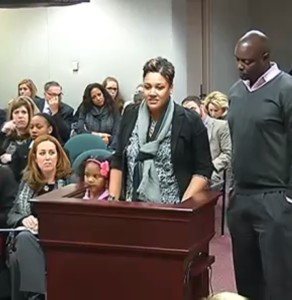
Two years ago, the income Demetrius Cherry received from commissions at his sales job suddenly plummeted. His wife, Nina Cherry, said they lost their home and were basically “couch surfing” with their four children, and constantly changing addresses. They had no choice but to leave Pasco County, which meant leaving behind public schools they felt were excellent.
On the move and casting about for options, they found their way to Tampa Bay Christian Academy, a private school where their children enrolled with the help of tax credit scholarships.
“I would have loved to keep my children at the public school, but because I lived in a different county, I wasn’t able to do that,” Cherry said.
That desire for public school options brought the family to Tallahassee on Wednesday, as lawmakers debated bills that would give parents the right to enroll their children in public schools of their choice, anywhere in the state, as long as there was room.
Before moving to Pasco, the family lived in Hillsborough County, near Tampa. Unsatisfied with nearby public schools, they taught their children at home for nearly two years before they moved and found neighborhood schools they liked.
Demetrius Cherry recently landed a new job, and he said his family may no longer qualify for income-based private-school scholarships next school year. They could soon be looking for new schools, again.
Research on school choice has begun to suggest that many families think like the Cherrys. It’s not about public or private. They’re looking for schools nearby that meet their children’s needs.
The proposed legislation, which lawmakers advanced last year but didn’t pass before the legislative session’s premature end, would expand open-enrollment policies in school districts across the state. Supporters argue children like the Cherrys shouldn’t be forced to leave their traditional public schools if circumstances force them to change addresses, and that they should be able to choose public schools across district lines.
The plan drew skeptical questions from Democratic lawmakers on the House Choice and Innovation Subcommittee, which approved HB 669 on Wednesday. Rep. Irv Slosberg, D-Boca Raton, said he saw the bill as a “charter school marketing” effort.
Rep. Reggie Fullwood, D-Jacksonville, lives in the Duval County school district, which considered open enrollment policies, but ultimately backed away from the idea. He said he’s been trying in vain to enroll his daughter in a highly sought-after magnet program.
“It’s just the nature of the beast. The good schools get filled up. There’s always a waiting list,” Fullwood said. In the proposed bills, “we’re talking about giving new schools that ability to recruit or market on a regional basis.” Those new schools, he said, would usually be charters.
Bill sponsor Rep. Chris Sprowls, R-Palm Harbor, said he ran the numbers on public schools in Pinellas County, where he lives. He said he found A-rated public schools that were only about two-thirds full, and F-rated schools at nearly 90 percent capacity.
Letter grades might not perfectly reflect whether a school would work for an individual child. But Sprowls said the numbers suggest there are traditional public schools that could attract more students if parents had more freedom to choose.
Sen. Lizbeth Benacquisto, R-Fort Myers, the sponsor of a similar public-school choice plan that won bipartisan approval in the Senate Education Committee on Wednesday, said students who leave their assigned public schools in search of other options are “leaving for a reason.”
“This provides a vehicle for us to focus on keeping them in the traditional public school system,” she said.
Step Up For Students, which hosts this blog, helps administer the tax credit scholarship program mentioned in this article.


